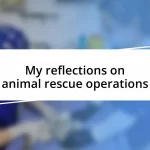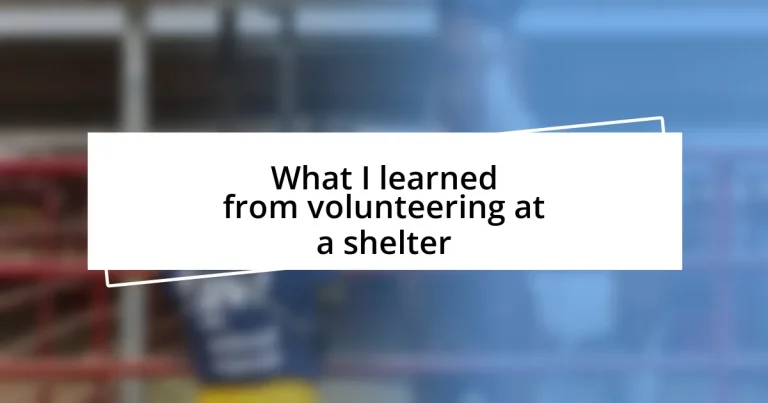Key takeaways:
- Volunteering at a shelter fosters personal growth through leadership, empathy, and resilience, enabling volunteers to connect deeply with those they assist.
- Hands-on experience teaches essential skills like organizational planning, conflict resolution, and team collaboration, enhancing both individual and collective efforts.
- Engaging in community outreach and shared meals strengthens connections, transforming perspectives on homelessness and encouraging continuous community involvement.
- Exploring diverse volunteering opportunities—such as with animals, youth mentoring, or environmental initiatives—opens avenues for impactful contributions beyond the shelter.
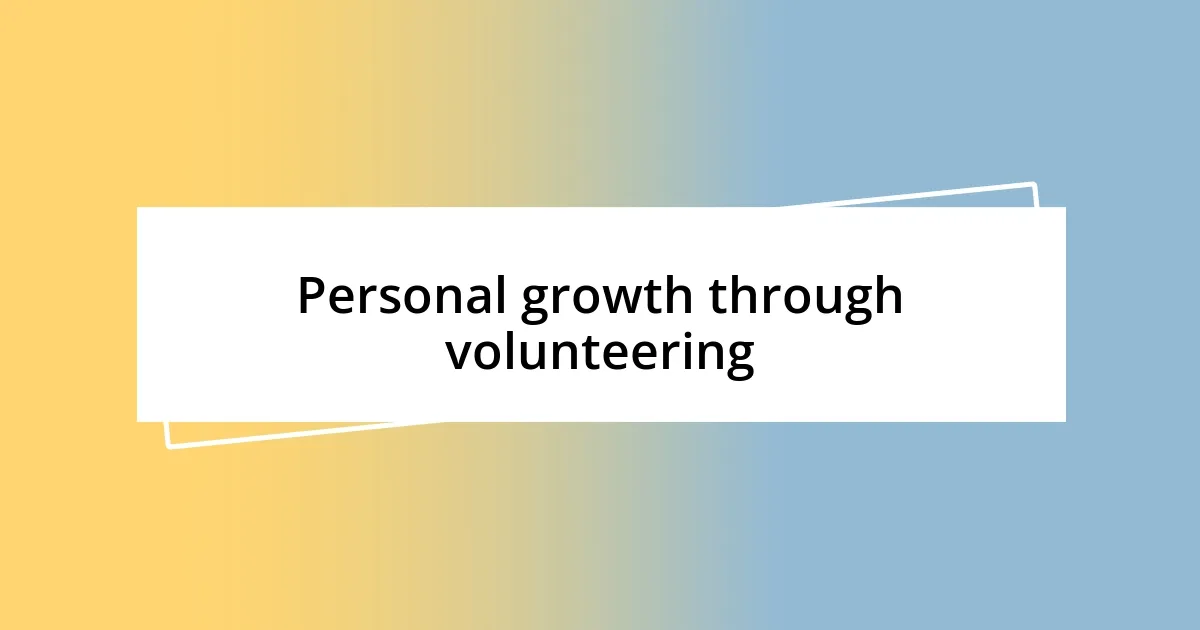
Personal growth through volunteering
Volunteering at the shelter challenged me to step outside my comfort zone. I remember a day when I had to lead a team of volunteers during a particularly busy food distribution. I felt the pressure, but that experience taught me invaluable lessons in leadership and communication. Have you ever found yourself in a situation where you had to take charge unexpectedly? It’s in those moments that personal growth often happens.
Through interactions with the individuals seeking help, I developed a deeper sense of empathy. One afternoon, a man shared his story about losing everything to a fire. Listening to him, I realized how important it is to appreciate what we have. It made me question my own struggles and reassess my priorities. Have you ever paused to reflect on how your challenges compare to those of others? It’s a humbling experience that can profoundly shift your perspective.
I’ve also learned the importance of resilience. There were days when the shelter was overwhelmed, and I could feel my energy waning. Yet, I found that pushing through those tough times not only helped those in need but also strengthened my resolve. Isn’t it fascinating how assisting others can also uplift your spirit? Each experience has contributed to my personal growth, shaping me into a more understanding and resilient person.
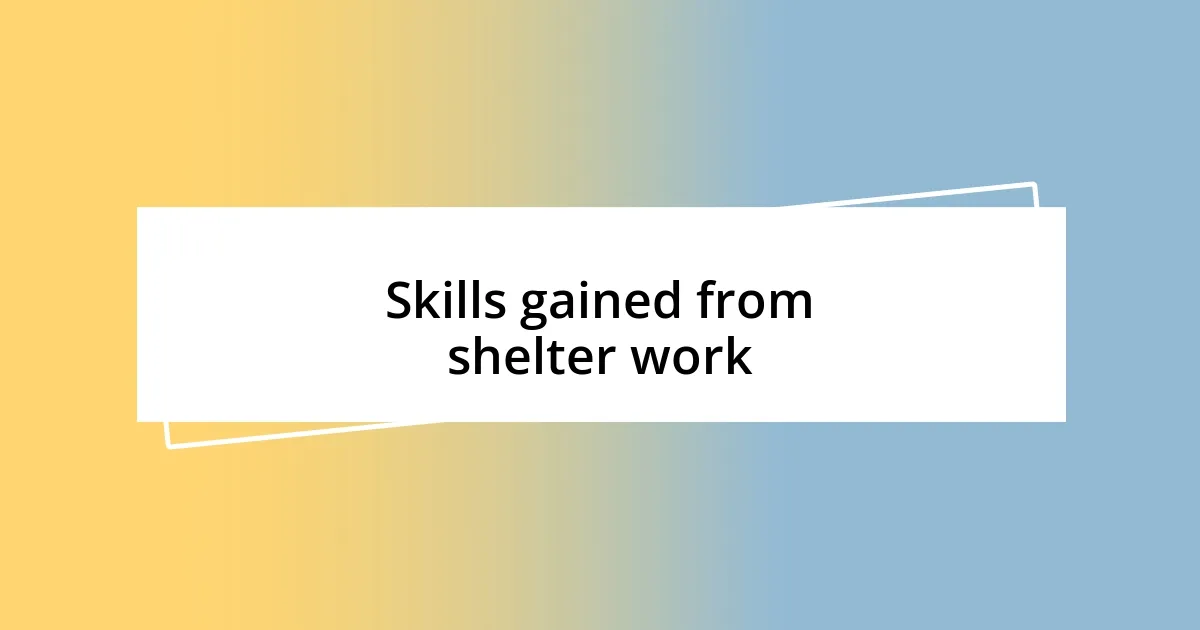
Skills gained from shelter work
Volunteering at the shelter equipped me with essential organizational skills. I vividly recall batching donations for distribution day—sorting through piles of clothes and food items. This task required me to think critically about how to allocate resources efficiently, reinforcing the value of logistical planning. Have you ever had to make order out of chaos? It’s a remarkable feeling when you succeed in creating a structured environment, especially in a bustling shelter.
Another key skill I developed was the art of conflict resolution. There were instances when tensions flared among guests over shared resources. I remember one particular evening when two individuals clashed over a blanket. By stepping in and facilitating a calm conversation, I learned how vital it is to listen actively and find common ground. Conflict doesn’t always have to end in discord; sometimes, it can lead to deeper understanding and community. Can you imagine how valuable this skill is in our everyday lives?
Lastly, my time at the shelter taught me the importance of team collaboration. Working alongside volunteers from diverse backgrounds was eye-opening. Each person brought unique strengths to the table, from cooking meals to providing emotional support. One evening, we organized a surprise celebration for the residents, and seeing everyone come together was heartwarming. It really hit home how collaboration can amplify collective efforts. Have you ever been part of a team that accomplished something truly special? It’s a reminder that together, we can achieve so much more.
| Skill | Description |
|---|---|
| Organizational Skills | Efficient resource allocation through logistical planning. |
| Conflict Resolution | Active listening and mediation to establish common ground. |
| Team Collaboration | Combining diverse strengths for a greater impact. |
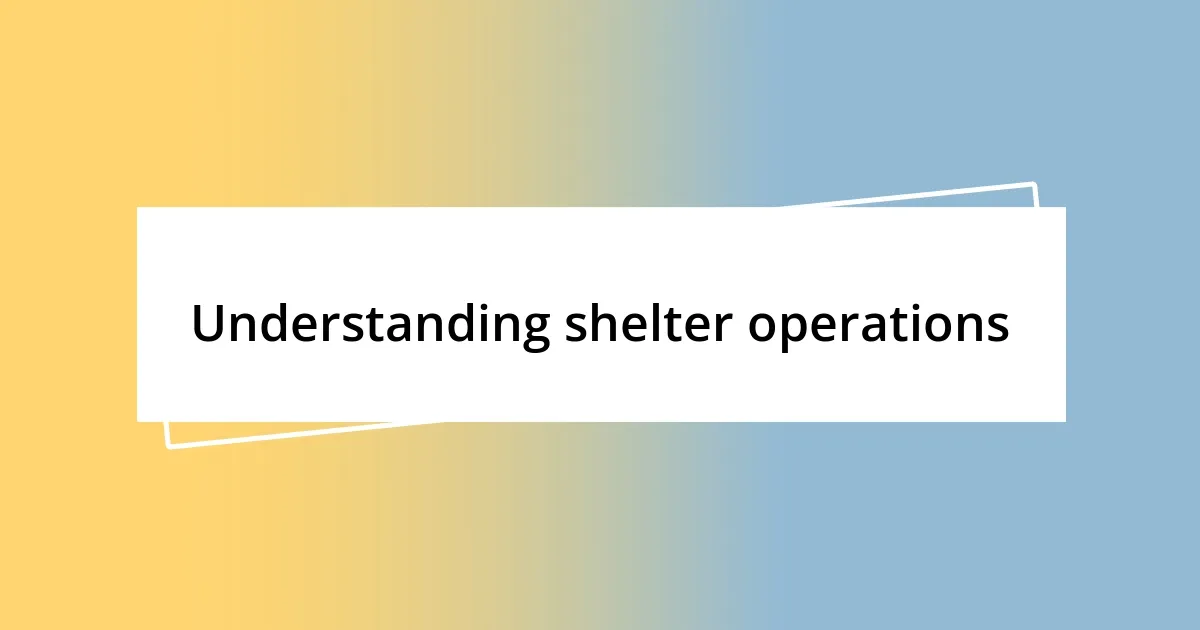
Understanding shelter operations
Understanding how a shelter operates goes beyond simply staffing and services; it’s about grasping the intricate web of relationships, logistics, and compassion that keep everything running smoothly. I found myself marvelling at how each role, no matter how small, plays a vital part in creating a safe and welcoming environment for those in need. It’s like a well-oiled machine, where every component has its purpose and contributes to the overall mission.
- Daily Operations: Shelters often run on tight schedules that require volunteers to be punctual and proactive.
- Resource Management: Proper allocation of food and supplies goes hand-in-hand with understanding the needs of the community.
- Communication: Clear communication between staff and volunteers is crucial for ensuring that everyone is on the same page.
I vividly recall the first time I witnessed a shelter’s operational efficiency firsthand. It was the day a large donation arrived—a mountain of clothing! I was amazed at how quickly and seamlessly the staff and volunteers rallied to sort, fold, and organize everything. Their teamwork was inspiring. This experience opened my eyes to the underlying structure and dedication that makes such organizations effective. It was a clear reminder of the impact that organized efforts can have on improving lives.
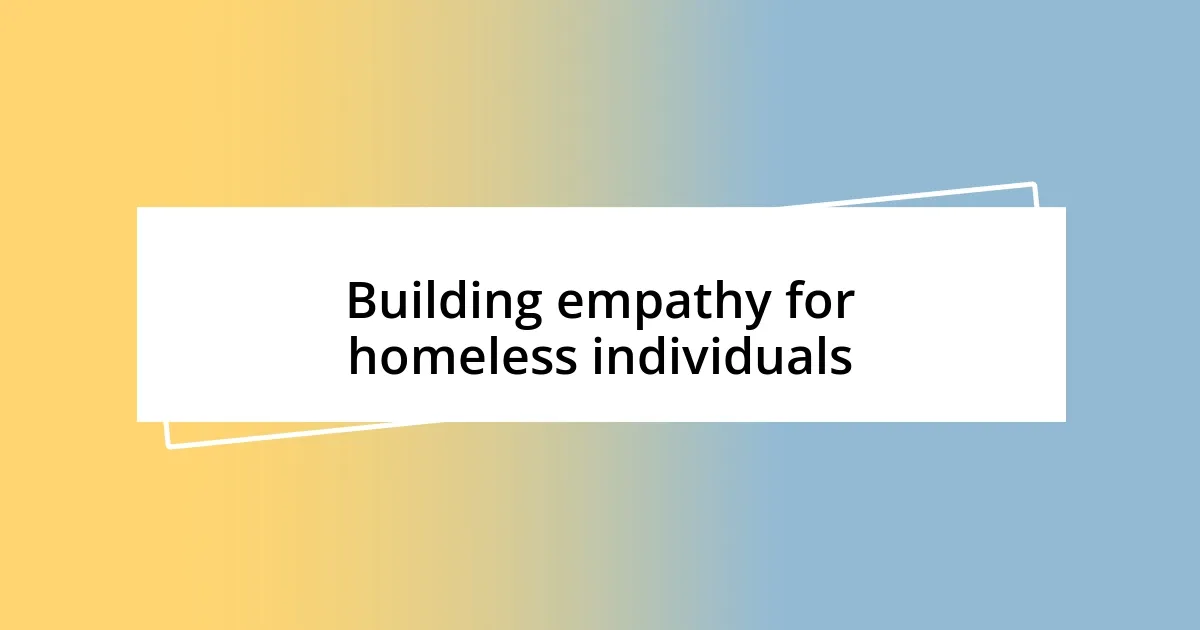
Building empathy for homeless individuals
Building empathy for homeless individuals is a transformative journey. I remember one chilly evening while serving dinner at the shelter. As I dished out plates of warm food, I couldn’t ignore the looks of gratitude and relief on the guests’ faces. It struck me that they weren’t just individuals without homes; they were people with stories, dreams, and challenges just like mine. Have you ever taken a moment to consider how a simple act of kindness can change someone’s day? That evening, I learned that empathy starts with understanding the human experience behind the circumstances.
As I engaged in conversations with the shelter residents, I was often reminded of the sheer unpredictability of life. One man shared how he had fallen on hard times after losing his job; it mirrored what I had seen many times in my own life—job uncertainty and financial stress. That connection made everything feel more personal. I can’t help but ask myself: What if the tables were turned? It was a powerful reminder that vulnerability exists in all of us, crossing barriers and breaking down preconceived notions about homelessness.
Witnessing the joy on a young mother’s face when she received clothes for her children was another pivotal moment for me. Beyond providing basic needs, it was about the dignity she felt in being able to care for her family. I realized that empathy isn’t just about feeling sorry for someone; it’s about recognizing their struggles and celebrating their victories, no matter how small. In what ways can we all strive to lift others up in moments of difficulty? Embracing this understanding has deeply shaped my perspective, emphasizing the importance of compassion in our everyday interactions.
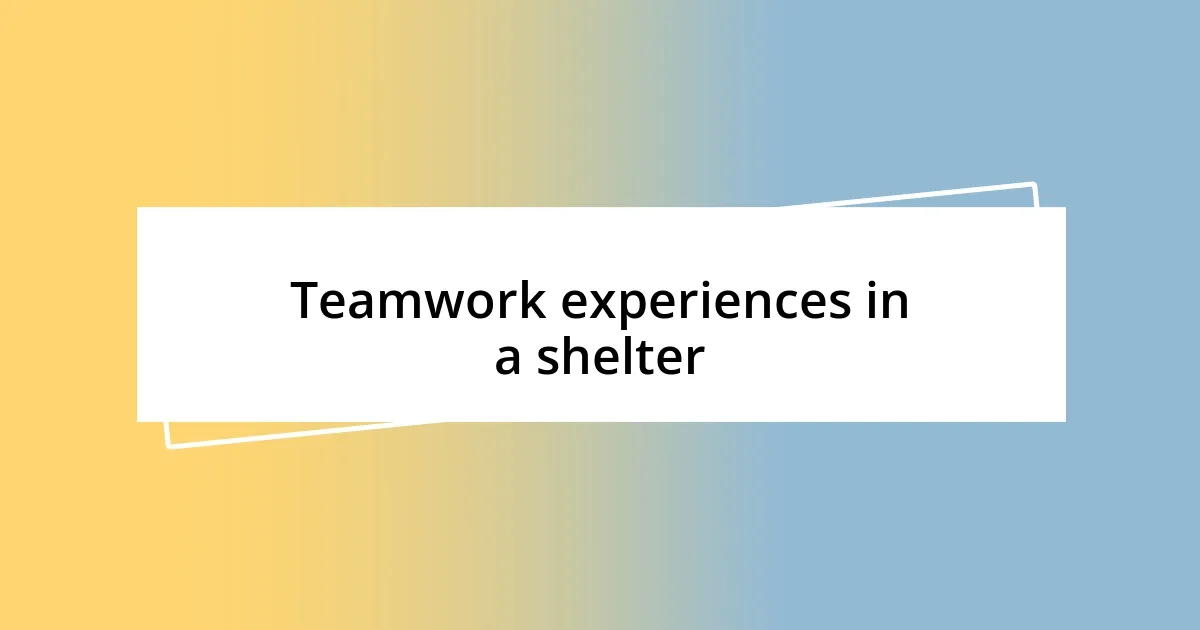
Teamwork experiences in a shelter
In my time volunteering at the shelter, I quickly learned that teamwork isn’t just a buzzword; it’s essential for effective service. One afternoon, I was part of a small group tasked with preparing meals. As we chopped vegetables and stirred pots, the camaraderie was palpable. We laughed, shared stories, and even experimented with a new soup recipe together. It was through this collaboration that I grasped the beauty of teamwork—how it transforms mundane tasks into memorable experiences. Have you ever felt that sense of unity that comes from shared effort?
I also noticed how diverse backgrounds and skills within the volunteer team complemented one another. For instance, there was an artist among us who transformed the waiting area with her creative flair. Her murals added a touch of warmth to the otherwise stark walls. I felt a sense of pride as we all contributed our unique talents toward a common goal, showcasing how teamwork not only enhances efficiency but also fosters creativity. Isn’t it incredible how individual strengths can merge to create something even greater?
On a particularly busy day, we had more guests than expected, and chaos threatened to take over. In that moment, I watched as the team sprang into action, seamlessly dividing tasks based on what each person excelled at. It reminded me of a sports team—when everyone knows their strengths and communicates effectively, even the most daunting challenges can become manageable. The relief I felt afterward, seeing everything fall into place, left me pondering: how often do we overlook the power of collaboration in our own lives? That experience solidified my belief in the magic of teamwork, and I walked away with newfound respect for every volunteer’s role in making a difference.
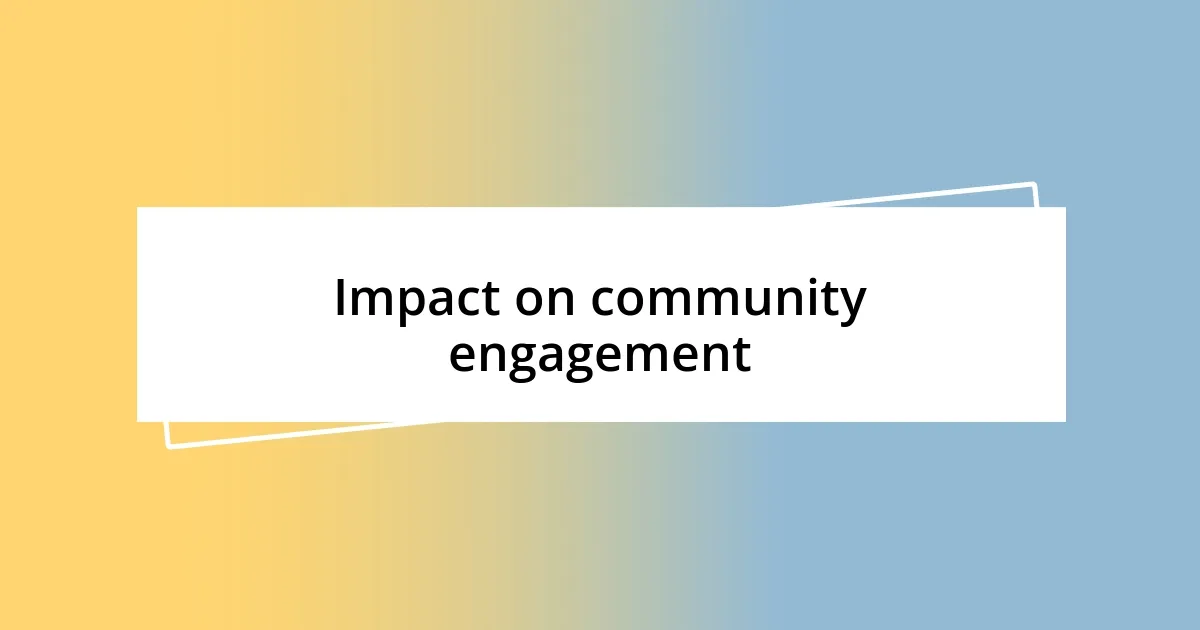
Impact on community engagement
One of the most remarkable aspects of volunteering at the shelter was witnessing firsthand the sense of community that developed among volunteers and residents alike. I recall a day when we organized a community meal, inviting not only the shelter guests but also neighbours from the surrounding area. As the tables were filled, it became clear that this event wasn’t just about food; it was about building connections. Have you ever felt the warmth of shared laughter over a meal? It’s incredible how food can serve as a bridge, breaking down barriers and fostering dialogue.
As I interacted with people from various walks of life, it dawned on me how essential community engagement is in addressing homelessness. Each story I heard added a layer of understanding to the challenges these individuals face. I remember talking with a woman who had lived in the neighborhood for years but had never ventured inside the shelter until she volunteered. Her perspective shifted that day, as she said it felt good to see the faces behind the issue rather than just the statistics. Isn’t it fascinating how one experience can alter our views so profoundly?
Furthermore, I noticed that volunteering sparked a ripple effect beyond the shelter walls. Many of my fellow volunteers began organizing similar community outreach initiatives in their own neighbourhoods. This inspired me, too. I thought, what if we all took small steps to engage with our communities more? It’s those minor actions—like hosting informal gatherings or sharing stories—that can create a more inclusive environment for everyone. Through this experience, I’ve come to realize that true community engagement lies in making connections and fostering understanding, one conversation at a time.
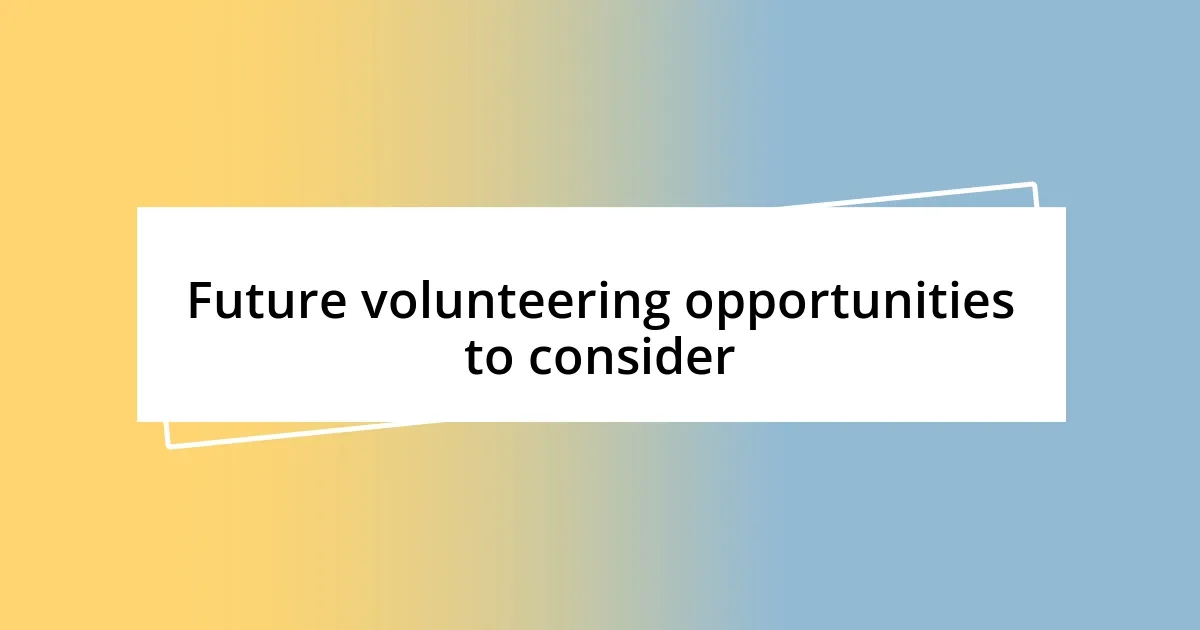
Future volunteering opportunities to consider
When considering future volunteering opportunities, animal shelters often come to mind. I remember one weekend at a local animal rescue—watching volunteers care for abandoned pets was both heartwarming and eye-opening. Each wagging tail seemed to say, “Thank you for being here,” and it made me curious: how many animals could we help if more people got involved?
Another rewarding area could be tutoring or mentoring youth. I once spent a summer helping children with reading skills, and the changes I saw in their confidence were inspiring. By simply dedicating a few hours each week, I could support their academic growth and even learn from their youthful perspective. Isn’t it incredible how a little attention and encouragement can change a young person’s outlook on education?
I also think about environmental volunteering, which has become increasingly important. One memorable day spent cleaning up a local park opened my eyes to the issue of pollution. It felt powerful working alongside others who shared the same goal—creating a cleaner, greener space for everyone. Have you ever paused to consider how small acts, like picking up litter, contribute to a healthier planet? Those moments can foster a sense of responsibility and connection to the community’s well-being, motivating others to join in our efforts for a sustainable future.










